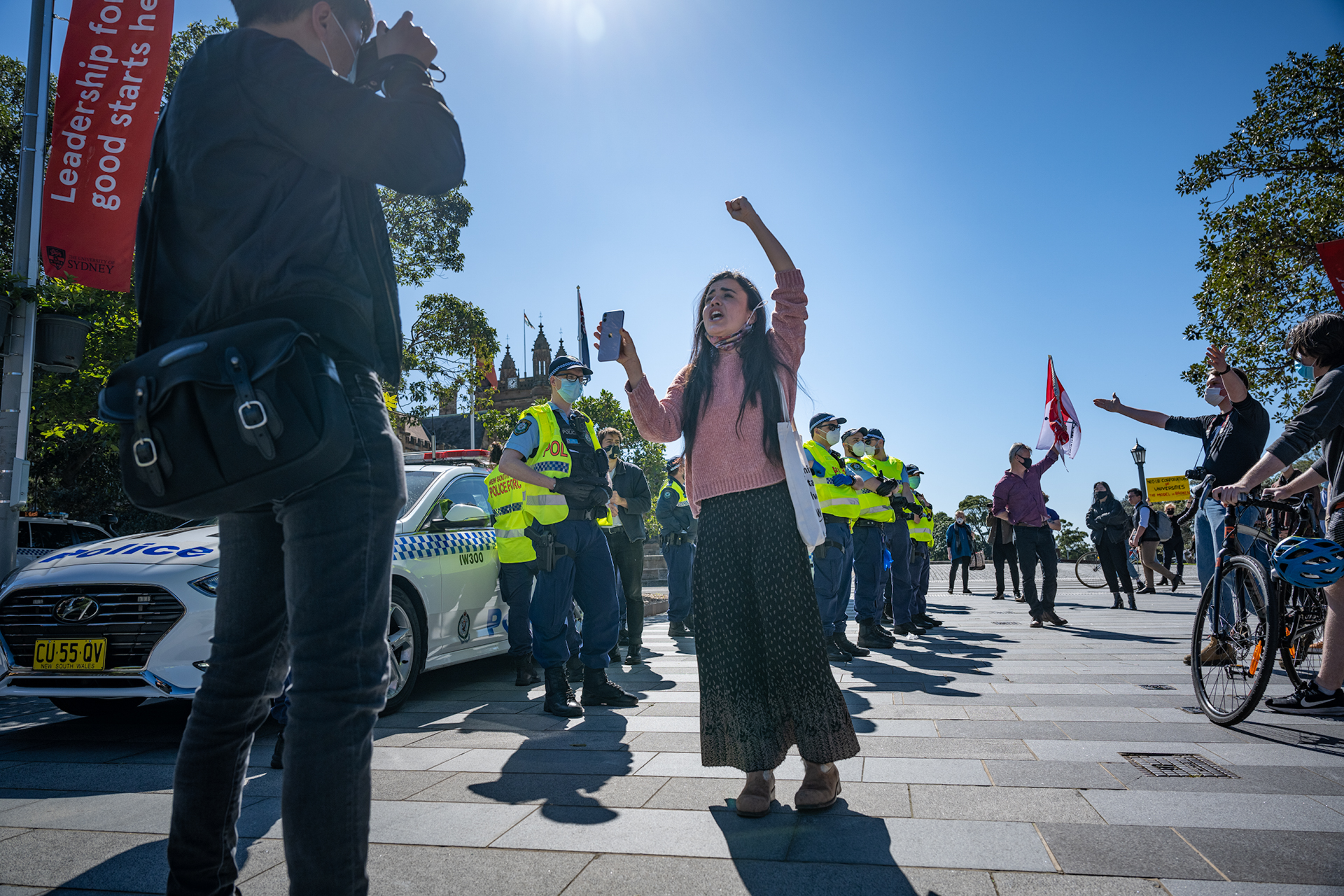*Sydney University student Vinil Kumar was surrounded by police within minutes of addressing fellow protestors. (Photo: Mark Kriedemann)
Australia’s universities are losing millions of dollars in revenue due to COVID-19, and students say they’re paying the price.
That’s the reasoning behind Friday’s (August 28) National Day of Action to protest proposed government fee hikes, cuts and HECS changes.
A Bill currently in the House of Representatives, proposes more than doubling the cost of arts and humanities subjects (113%), while Law and Commerce fees would rise by 28 per cent. However, students studying teaching, nursing and STEM subjects (science, technology, engineering and maths) would pay 62 per cent less.
In a statement, Education Minister Dan Tehan said: “We are encouraging students to tailor their studies to learn the skills that will be in demand in areas of future jobs growth. That means breaking down the traditional degree ‘silos’ by choosing units of study across disciplines and introducing a price signal to students by making degrees cheaper in areas of expected job growth.”
However, many students disagree that this push towards “job-ready” subjects will work, and argue that it is designed to cover-up the government’s decreasing investment in universities.
RELATED STORY: University fee hike: Day of Action – Sydney
Liam Donohoe, University of Sydney SRC President, said of the fees: “[they are] accompanied by a reduction in government funding. So, STEM fees are being decreased but government funding is being decreased. So, overall, you can have more people studying STEM but the quality of a STEM education is going to decline significantly.
“This is not about decreasing fees for STEM students, what this is about is decreasing funding overall.”
*University students are becoming increasingly angry over staff cuts and fee increases. Now their protests, like Friday’s National Day of Action rally in Sydney, are being shutdown before they even begin. Video: Soofia Tariq, Emilia Roux and Nadya Labiba. Editing: Rachel Clark
The economic fallout of COVID-19 has also reduced international enrolments, leading to further loss of revenue for Universities. Students also say that the sacking and casualisation of staff has impacted the overall quality of education.
According to Jack Mansell, University of Sydney SRC Education Officer, “students are coming to campus and not even having a teacher for their classes.
“I have a class [in] which every week a PDF is uploaded… there is no teacher. It is just a Unit Coordinator who has one hour a week where you can contact her. So what we are seeing is the quality of education being massively degraded by the sacking of permanent and casual staff.”
— Story, Soofia Tariq @soofiatariq. Photo Gallery, Mark Kriedemann @KriedemannMark
Protest shutdown
Police say the “No University Fee Hikes and Cuts” protest at the University of Sydney campus on Friday (August 28) was shutdown because it exceeded the 20-person limit on outdoor gatherings in public spaces.
NSW Police arrived prior to the event, over concerns the planned protest would breach current NSW Public Health orders.
As soon as a sizeable crowd gathered, protesters were told to disperse from the premises immediately, or risk being fined $1000. While no-one was arrested, ten fines were issued.
Student Jack Mansell was among those detained and fined. He said it was “pretty remarkable” how “prepared” NSW Police were to shut down the protest, despite organisers’ detailed plans to ensure social distancing.
“They don’t break up any other form of public gathering, which happens every day at Broadway shopping centre for example. We have to go into classes of 35 people [and] they don’t come and break those up, despite the fact they’re far more dangerous.
“People [also] sit [on campus] every single lunchtime and socially distance [in] equally distributed groups of definitely more than 20 people.”
Under current COVID-19 laws, the University is considered an essential service, and is generally exempt from the 4 square metre requirements. In a statement, it says it supports the students’ rights to freedom of speech, and hence does not prevent protests from taking place on campus, so long as they are practiced in a legal, safe and respectful manner.
However, the university also said it has no control over actions taken by NSW Police to quell protests that appear to break social distancing laws.
Mr Mansell, who has organised similar student protests as an Education Officer of the Sydney University SRC, noted the difference in police involvement in other rallies at Town Hall.
“This is definitely the worst there has been in terms of police presence.
“We’re going to have to seriously strategise as to what we’re going to do to resist that encroachment on our right to protest because it’s a very worrying trend that’s happening on campuses.”
— Nadya Labiba @nadrlabiba
— Supervising Student Editor, Henry McGilchrist @mcgilchrist_hen Planning Editor, Bevin Liu @jliubev







